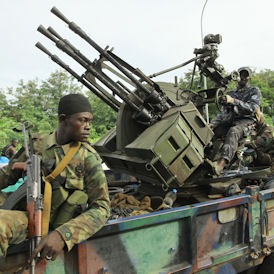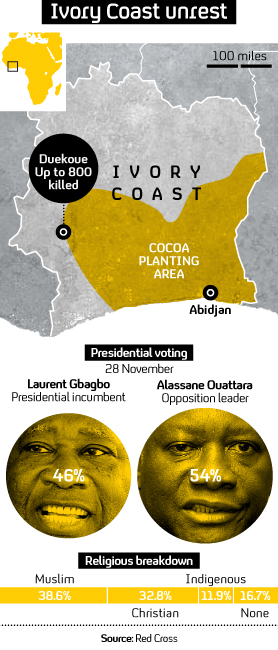UN commander: ‘The war in Ivory Coast is over’
A United Nations commander tells Channel 4 News “the war is over” after a fierce assault on Abidjan, as Laurent Gbagbo appears to be close to surrender and seeking UN protection.

After four months of conflict, Ivory Coast’s Laurent Gbagbo is reportedly close to bowing to international pressure by signalling he is ready to recognise his northern rival Alassane Ouattara as the rightful president of the country.
Despite reports from the UN and France saying that Gbagbo was negotiating the terms of his surrender, he appeared on France’s LCI television den that he was not surrendering, considered himself the leader of Ivory Coast, and hostilities would only end after face to face talks with his rival Ouattara.
He said: “The army has called for the suspension of hostilities…and it is currently discussing the conditions of a ceasefire with the other forces on the ground, but on a political level no decision has yet been taken,” he said.
It came after his spokesman Ahoua Don Mello said: “There are direct negotiations based on African Union recommendations which said Alassane Ouattara is President. They are also negotiating judicial and security conditions for Gbagbo’s camp and his relatives.”
‘The war is over’
The United Nations peacekeeping mission in Ivory Coast said it has received telephone calls from the heads of forces loyal to Gbagbo, stating that their soldiers have been instructed to stop fighting and hand in their weapons to the UN. Reuters reported that it had seen UN documents confirming that Gbagbo had surrendered and was seeking UN protection.
“The guns have fallen silent, the fighting has stopped, and the war is over.” Lieutenant Colonel Rais Shakib, United Nations
The French Foreign Minister, Alain Juppe, said of Gbagbo: “We are on the brink of convincing him to leave power…We have asked the United Nations to ensure his physical safety and that of his family.”
Ten thousand troops loyal to Alassane Ouattara took the main city of Abidjan – which was Gbagbo’s last remaining stronghold – during what they called their “final assault”.
They were backed up by air strikes on Gbagbo’s heavy weapon capabilities by French and UN forces. Attacks centred on military bases in the city, but also on rocket launchers “very close” to Gbagbo’s Cocody residence, U.N. peacekeeping chief Alain Le Roy said.
Lieutenant Colonel Rais Shakib from the UN peacekeeping operation in the Ivory Coast told Channel 4 News: “The guns have fallen silent, the fighting has stopped, and the war is over.”
He said that “all of Gbagbo’s top generals have surrendered”, including the head of the Ivorian army General Mangou.
“Gbagbo may be gone but we do not know where his men are. They are nowhere to be seen. Without a leadership they may not be able to regroup, but it is far too early to say these things.”
Questioned on the subject of the possibility of reprisal killings by Ouattara’s men in response to Gbagbo atrocities, Lt Col Shakib said he had received “no reports of killings by Ouattara’s men in the city.”
Now that the fighting appeared to be over he said that only time would tell if Ouattara would bring stability to the Ivory Coast.
“It is far too early to say if people in the Abidjan and the south will accept his rule,” he said.
“Our real job is to help the people of Abidjan, they have no food, they need water, and the UN is assisting them as much as we can and will stop violence whenever we can,” he added.
Risk of reprisal killings
Human Rights Watch’s Corinne Dutka in Dakar told Channel 4 News that “Abidjan is now replete with armed young men, many of whom have not received proper training, and this raises human rights concerns.”

Dutka, who has worked extensively in the Ivory Coast during the latest conflict and during the war in 2002, said the “the risk of reprisal killings is very high”.
“Maintaining discipline will be difficult, given that Ouattara’s forces are made up of a loose coalition of former rebels, gendarmes, and Gbagbo defectors,” she added.
“In 2002 we recorded the most brutal kinds of war crimes imaginable, committed by both sides. These were never properly investigated and we should be very worried about a culture of impunity for such acts. I hope the international community properly investigates very credible reports of atrocities that are emerging from the country.”
The battle for Abidjan took place amid a backdrop of human rights atrocities committed by both sides.
Guillaume Nguefa the Deputy Head of the Human Rights Division of the UN Mission in Ivory Coast spoke to Channel 4 News whilst at the scene of a “serious human rights violation” in Duekoue, where the International Committee of the Red Cross say 800 people were killed after the town was taken over by pro-Ouattara forces last week.
Mr Nguefa told Channel 4 News that violence has not been confined to Duekoue and that “there have been many reports of human rights abuses by both sides across the country, all of them will be investigated,” he said.
He added that his team would also be investigating other “serious allegations” in the west including in Guiglo and two other villages.
Read more: Ivory Coast: reports of massacres 'across the country'
Channel 4 News spoke to Delphine Chedorge from Medecins Sans Frontiere. She is the coordinator of the Abobo Sud hospital – the only functioning hospital in Abidjan- where the staff haven’t slept for days in what she calls “extreme conditions”. Listen to the interview below.
-
Latest news
-
As India goes to the polls in the world’s largest election – what do British-Indians think?6m

-
Tees Valley: Meet the candidates in one of the biggest contests coming up in May’s local elections4m

-
Keir Starmer says public sector reform will be a struggle7m

-
Nicola Sturgeon’s husband Peter Murrell charged with embezzlement of funds from SNP1m

-
Ukraine might finally get $60billion in American weapons and assistance to defend against Russia3m

-




